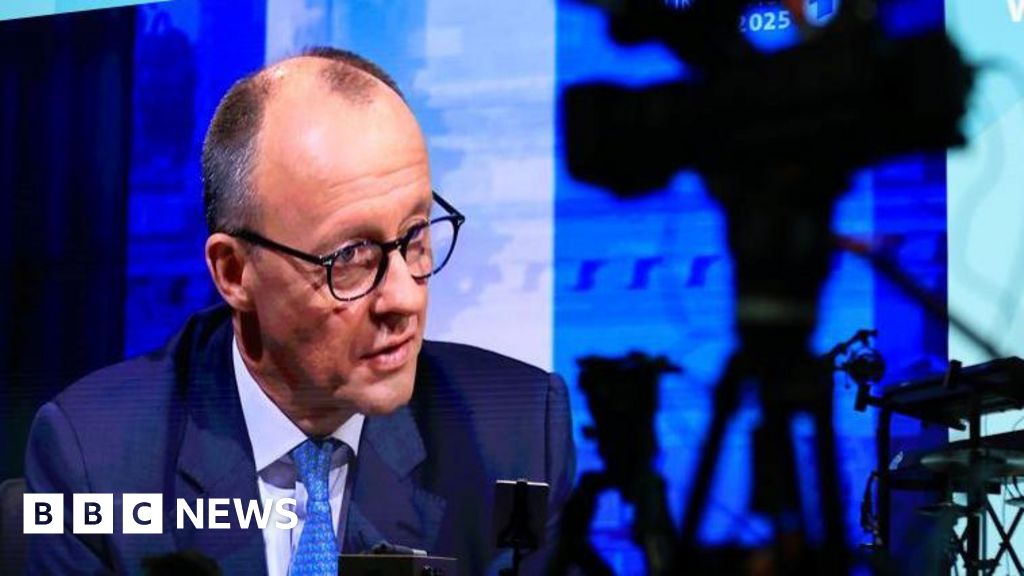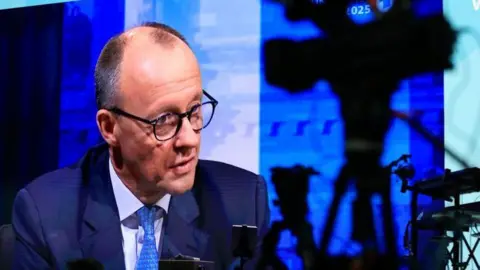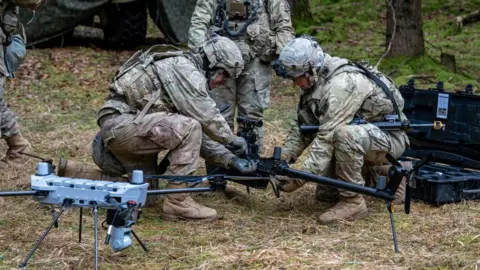

Getty Images
Germany’s incoming chancellor made headlines even before the final election results were announced on Sunday, proclaiming a fresh chapter for Europe.
Friedrich Merz criticized the US for appearing indifferent to Europe’s stability, urging for a swift enhancement of Europe’s defense efforts in response.
His stance, especially coming from a known Atlanticist and close US ally, marks a significant transformation from perspectives held just months prior.
This represents a profound shift in dynamics, as the present circumstances of transatlantic relations are unprecedented in the eighty years since World War II concluded.
Major European nations have been deeply unsettled by the Trump administration’s stance, which implied the potential withdrawal of security assurances established since 1945.
On Sunday, Merz drew parallels between Trump’s America and Russia, both perceived as significant security threats to Europe. He emphasized the pressing need for Europe to act decisively.
UK Prime Minister will visit Washington on Thursday, following a meeting with French President Emmanuel Macron earlier in the week.
Merz expressed a sense of urgency about Germany’s absence from these discussions, noting that as one of Europe’s “Big Three” powers, it should be included.
With the US and Russia engaged in bilateral talks concerning Ukraine—not including Ukraine itself—it reflects a global resurgence of traditional power politics.
Germany has been notably absent from both European and global dialogues, largely due to its previous government’s internal conflicts that frustrated voters seeking a focus on economic and migration issues.
Merz highlighted the urgency for Germany to re-establish its international engagement.
Currently, Germany ranks as the second-largest military aid provider to Ukraine, trailing only the US.
While continuing this support, he remains cautious about deploying German troops to Ukraine, unlike France and the UK.
However, Germany has a history of being slow to respond in terms of Ukraine assistance and has ultimately contributed more aid than other European countries—implying that a current refusal doesn’t rule out future troop commitments or involvement in a European reassurance force in Ukraine.
At present, the primary concern for many Germans revolves around the 35,000 American soldiers stationed in their country, contributing to a sense of security.
It is uncommon for foreign policy to dominate voter priorities during elections, yet in Germany, alongside economic and migration issues, voters expressed significant concerns about maintaining peace in Europe.
In November, Germany’s interior ministry initiated plans for civilian emergency shelters, reflecting rising anxieties.
Despite the geographical distance, many Germans feel threatened by Russia for two primary reasons.
First, the substantial military support provided to Ukraine has been a point of contention, with the far-right Alternative for Germany (AfD) party advocating for a reduction in ties with Kyiv and a restoration of relations with Russia as seen in Trump’s policies.
Second, a prevailing belief exists that Russia may consider targeting one of Europe’s leading nations with long-range missiles if it aimed to destabilize the continent.

Getty Images
Unlike France and the UK, which are nuclear states, Germany lacks this capability and faces significant challenges with its conventional military being under-resourced and underprepared, leaving it vulnerable.
This vulnerability is heightened by the potential withdrawal of US forces, as Trump has indicated a desire to significantly reduce troops stationed in Europe.
The anxiety stemming from domestic insecurity prompted Merz to propose seeking a European nuclear umbrella with France and the UK to replace American guarantees.
While this is a compelling point to raise during campaigns, implementing this idea would be exceptionally complex, involving intricacies of military capability, commitment, and governance.
A realistic assessment reveals that Merz will require substantial funding to realize his security objectives for Germany and Europe, particularly as Germany’s economy is currently facing challenges.
He will also have to negotiate effectively with coalition partners to form the upcoming German government, as well as achieving consensus with other European nations, including the UK.
There may be reluctance among these countries to adopt such a forthright stance against the US.
This election could signal a shift towards stronger German leadership. However, the readiness of the rest of Europe to embrace this change remains uncertain.










